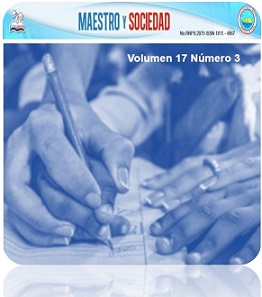Dynamics of the bio-antropo-social professional formation in the Biomedical Sciences
Array
Keywords:
: students of Medicine, professional formation, bio-antropo-social professional formation, Biomedical Sciences, pedagogic strategyAbstract
The insufficiencies in the formative orientation of the medical scientific contents in correspondence with the understanding, explanation, and interpretation of the human being, were addressed through the dynamics of the professional training process in Biomedical Sciences. The objective of this research is to develop a pedagogical strategy for professional training in Biomedical Sciences, based on a model of the dynamics of bio-anthropo-social professional training that contributes to the improvement of the basic cycle of the Medicine career for the study of the human organism with a holistic vision. The partial application of the proposed pedagogical strategy was carried out, and a social impact was achieved in the improvement of the general practitioner training process that leads to the transformation of their performance, by providing solutions to the health problems that arise in the individual, the family and the community with a biopsychosocial-cultural approach.
References
2. Querts M., O. (2008). Algunas consideraciones sobre el sistema de conocimientos de la Disciplina Morfofisiología Humana. Revista electrónica Medisan, 12(1).
3. Vygotsky L., S. (1929). The problem of the cultural development of the child. Journal al Genetic Psycholog., 36, 414-434.
4. López, J. V. (2014). Fundamentos didácticos y curriculares del proceso pedagógico experiencias en la universidad cubana. Recuperado de http://ftp.ss.rimed.cu/Cd/20Eventos/CD%20Univer%202014%20Internacional.rar
5. Pérez P., N. (2016). La formación permanente del maestro tutor de los estudiantes de la Licenciatura Educación Primaria. (Tesis de doctorado). Universidad de Oriente, Santiago de Cuba, Cuba.
6. Stalin F. D., D. (2016). Orientación profesional de los estudiantes del Bachillerato General Unificado. (Tesis de doctorado). Universidad de Oriente, Santiago de Cuba, Cuba.
Published
How to Cite
Issue
Section
License
This journal provides immediate open access to its content, based on the principle that offering the public free access to research helps a greater global exchange of knowledge. Each author is responsible for the content of each of their articles.



























 Universidad de Oriente
Universidad de Oriente 